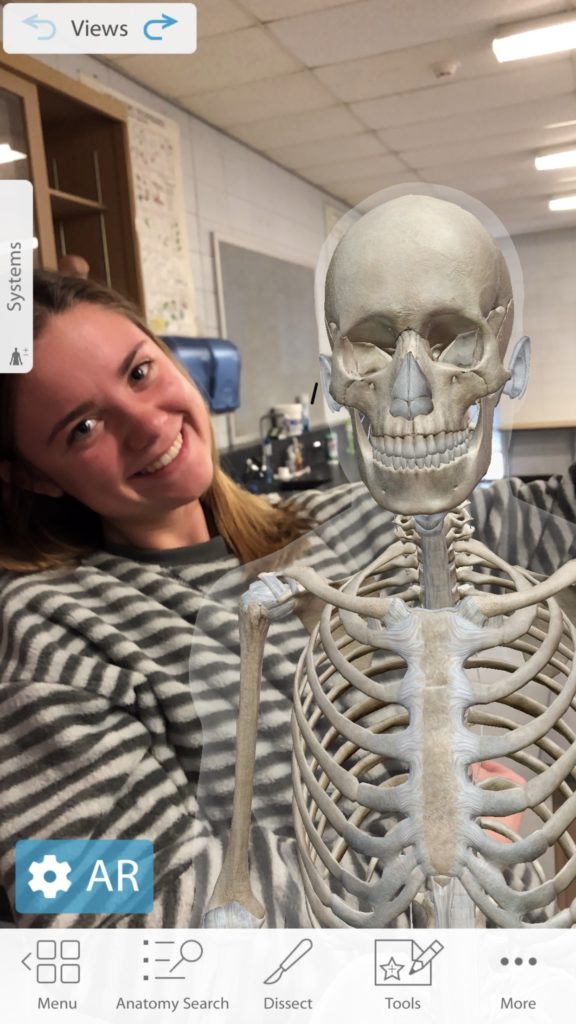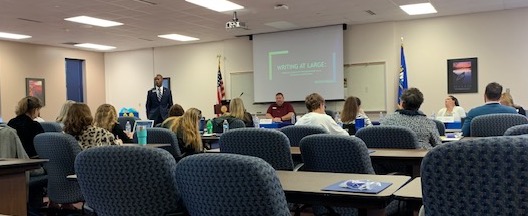Innovative projects at MGCCC support student success and retention

The 2019 Innovator’s Award winners have found great success with their projects, which are designed to impact student success and retention while ensuring rigor. The two winning projects, Engaging Dual-Credit Faculty and Science AR Advancement, both provide dynamic and innovative ideas to improve quality of instruction and student-learning opportunities.
The Engaging Dual-Credit Faculty project is a coordinated effort to include dual-credit faculty at area high schools in the normal flow of information and training that occurs with full-time on-site faculty. During the past few months, dual-credit faculty have been provided the guidance and support of fellow college-level instructors and campus resources. These newly trained faculty members are then able to provide their students with information on college learning resources and support that are available to them. The first workshop for dual-credit faculty was held in August with 45 teachers in attendance. A follow-up meeting was held in January with 65 attendees. The next meeting is scheduled for May 11.
“The feedback we have received from dual-credit instructors has been great,” said Susan Bosarge, Language Arts Department chair at the Jefferson Davis Campus. “They appreciate the exposure to new instructional methods and the time to gather and share ideas. They are all looking forward to future opportunities. This was a much-needed effort. We are hoping to expand the program in the future to include dual-credit instructors for the Jackson County and Perkinston campuses as well.”
Team members on the dual-credit project are Dr. Debra Atkinson, Susan Bosarge, Dr. Kathryn Morris, Andrea Clark, Dr. Jeremy Daughtry, Monica Donohue, Jennifer Leimer, Adrienne McPhaul and Steve Roberts.
The Science AR Advancement project utilizes iPads in the science classrooms to enhance student engagement and motivation through the Visible Body Human Anatomy Atlas. The Atlas includes fully interactive 3-D anatomical models of every human body system, a variety of animations, cadaver interactions, pathology applications and Augmented Reality. The augmented reality feature allows students to see the real-life environment right in front of them with a digital augmentation overlay. An example of its use is that instructors are able to place a medically accurate augmented cadaver on the lab table and dissect it in front of students. The Atlas is integrated into the MGCCC website for open access to this amazing technology for all students and instructors.
“Visible Body was implemented this year, and all of our students are excited to use it,” said Dr. Kelly Rouse, science instructor at the Jefferson Davis Campus. “Anatomy and Physiology students in traditional and online classes have access to the app to study at home and at their convenience. This engaging app provides instructors with the ability to show all students highly detailed 3-D anatomical structures that can be manipulated through augmented reality, and it is an excellent platform to communicate the structure function relationship in Anatomy and Physiology.”
“Visible Body is an amazing app that helps me understand the different parts of the body a lot better,” said Shatika Callaway, an Anatomy and Physiology student. “I am a kinesthetic and visual learner, so seeing the body right in front of me makes it a lot more fun and easier to learn.”
“I have absolutely loved using Visible Body,” said Charish Pate, an Anatomy and Physiology student. “It has helped with all aspects of the class, and it is also really fun. Having this app has helped me study so much better.”
Team members on the science project are Dr. Kelly Rouse, Dr. Angela Bruni, Jeff Siegel, Dr. Kathryn Morris and Robert Baughman.
MGCCC established the Innovator’s Award in the 1980s as the Learning Challenge Awards. It was reenvisioned in 2013 to focus on innovative projects that move the needle forward for the college. All employees are invited to participate with additional emphasis on accountability and measurement of impacts. Larger grants of up to $1,000 may be awarded to individuals or $2,000 to teams with the aim of promoting collaboration among employees and encouraging interdisciplinary projects.

